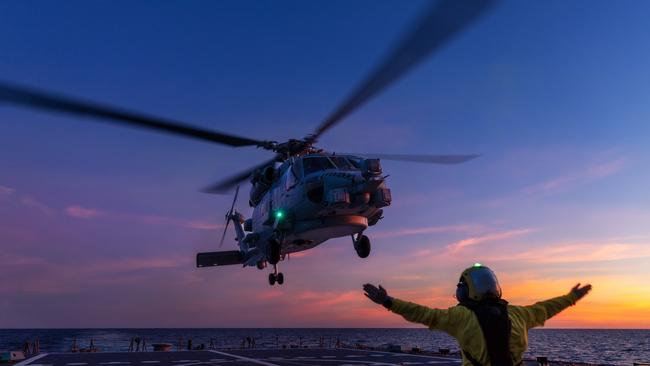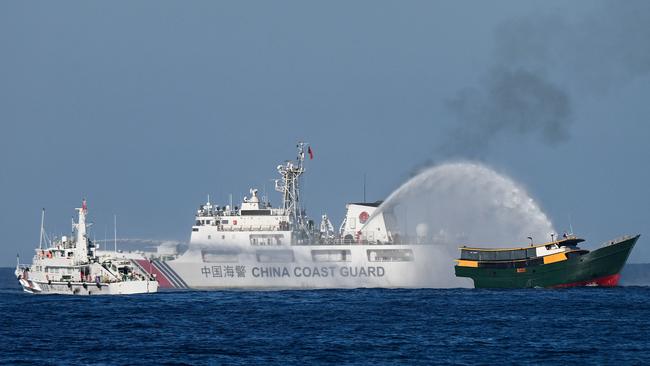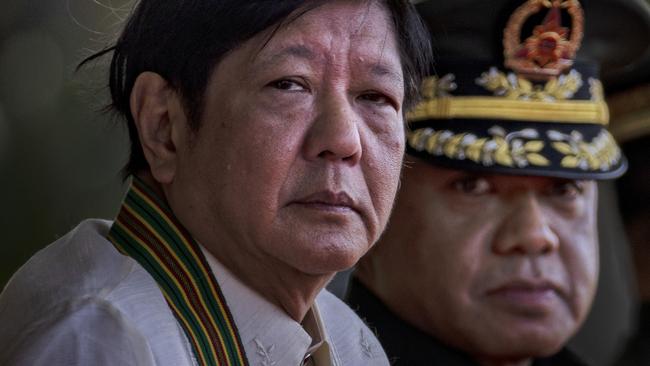China’s tactics ‘illegal, coercive’, Defence chief Angus Campbell warns
Defence Chief Angus Campbell has lashed China’s ‘illegal, coercive, aggressive, and deceptive’ conduct as he repudiated Beijing’s claim an Australian helicopter was spying on a PLA-Navy exercise before it was threatened.

Defence Chief Angus Campbell has lashed China’s “illegal, coercive, aggressive, and deceptive” conduct as he repudiated Beijing’s claim an Australian helicopter was spying on a PLA-Navy exercise before it was threatened by a Chinese jet.
General Campbell bristled at China’s allegation the Seahawk helicopter was conducting “close-in reconnaissance” of Chinese warships in the Yellow Sea on Saturday when one of its jets dropped flares in front of the Australian aircraft.
“The helicopter was behaving in a correct and disciplined fashion and I don’t accept that the (Chinese) response was anything but unsafe and unprofessional,” he said at an air force conference in Canberra.
Amid an escalating blame game with Beijing over the near miss, General Campbell commended his Philippines’ counterpart General Romeo Brawner, who “knows up close and personal what the angry end of a (Chinese) water cannon means”.
China injured several Filipino personnel with high-pressure water cannons in recent weeks at the Second Thomas Shoal, which a UN tribunal ruled in 2016 was in The Philippines exclusive economic zone.

Some describe China’s near-constant harassment of Filipino vessels in the South China Sea as “grey zone” tactics, but General Campbell said General Brawner had a better description.
“We should call it what it is. And General Brawner and his senior colleagues in the Filipino security community describe it as ICAD – illegal, coercive, aggressive and deceptive,” General Campbell told the Air and Space Power Conference.
“And I commend his courage and that of his sailors and marines, in supporting his people on the Second Thomas Shoal.”
The Chinese J-10 fighter jet dropped flares about 60m above and 300m in front of the Australian helicopter, which was policing sanctions against North Korea in international waters, forcing the aircraft to take evasive action.
China’s Foreign Ministry claimed on Tuesday that the Australian aircraft “deliberately approached China’s airspace … endangering China’s maritime and air security”.

Beijing changed its story the following day, claiming the helicopter tried “three times to conduct close-in reconnaissance and disturb the normal training activities of the Chinese side”.
Anthony Albanese rejected the spying claim, saying the Australian aircraft was engaged in “legitimate, peaceful activity which should be respected” by Beijing. “I’m proud of the role that Australian Defence Force personnel play in upholding international law and international sanctions, and the appropriate processes as determined by the UN,” he said. “This action by China was unprofessional and unacceptable. We’ve made that very, very clear going forward.”
The government has lodged protests over the incident through Defence officials and diplomats.
Peter Dutton said the incident could have been “catastrophic”, and “the Prime Minister should be on the phone today to the Chinese President to say this is completely and utterly unacceptable”.
Opposition home affairs spokesman James Paterson said the government should release on-board footage of the incident to show “what happened here and just how dangerous it was”.

Britain’s Chief of the Air Staff, Richard Knighton, endorsed the suggestion, saying the UK often released videos of dangerous conduct by Russian warplanes to call out bad behaviour. “The key lesson is around communication, being super clear about calling out poor behaviour, demonstrating that with the use of video footage, and really signalling very clearly to Russia and China – and to their air forces – what a professional intercept looks like,” Sir Richard told the ABC at the Air and Space Power Conference.
US Space Force General Chance Saltzman condemned China and Russia at the conference for “destructive anti-satellite tests” that had created dangerous debris fields that placed all nations’ satellites at risk.
“This is irresponsible behaviour,” he said, adding China was investing in a full suite of anti-satellite weapons.
“They are demonstrating the capability to use them on orbit, and Russia is right behind them in those capabilities. So that’s concerning,” General Saltzman said.
General Campbell, whose term ends on June 30, used his speech on Thursday to blast “cringing” critics of Australia’s nuclear-powered submarine program, likening them to those who thought the Sydney Harbour Bridge would fall into the ocean and the Opera House would never be built.
He said those who claimed the subs would never be built should suspend their disbelief and get involved in the program.
“Give it a go, because we are delivering nuclear-powered submarine capability to this nation, full stop,” he said. “And it will be an extraordinary program, and we will deliver. Because I don’t cringe when thinking about the defence of this nation.”
General Campbell also said Defence was working to fast-track new recruits into the service and encourage serving members not to leave, but there was “still some effort to go” before the situation would be turned around.




To join the conversation, please log in. Don't have an account? Register
Join the conversation, you are commenting as Logout